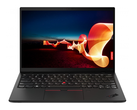We have already reviewed the MacBook Air 2020 with Apple's own M1 processor, ans especially the removal of the annoying chassis fan is a step in the right direction. The entry-level MacBook Pro 13 with 2x Thunderbolt ports also got the M1 update, but it keeps the active cooling solution. The Pro is also equipped with the Touch Bar and a slightly bigger 58.2 Wh battery. We have initial test results, but we are a bit surprised by the performance figures.
CPU and GPU Performance
It is obviously no secret that Apple uses identical M1 chips with 8 CPU and 8 GPU cores for the MacBook Pro 13 as well as the MacBook Air. However, there is no difference between the two models in the initial benchmarks. We expected more headroom for the processor due to the fan, but the active cooling unit only seems to be ensuring the consistency of the performance (which it does). This means most users will never notice a difference between the two MacBooks.
| 3DMark - Wild Life Unlimited Score | |
| Apple MacBook Pro 13 Late 2020 M1 Entry (8 / 256 GB) | |
| Apple MacBook Air Late 2020 (M1, 8 Core GPU, 8 GB RAM) | |
Battery Runtime
Compared to the MacBook Air (49.9 Wh), the MacBook Pro 13 has a slightly bigger 58.8 Wh battery pack, so the battery runtime is also a bit longer. We recorded more than 20 hours in our Wi-Fi web browsing test at 150 nits, which is great. Similar to the MacBook Air, we see a roughly 50 % shorter result when we repeat the test at the maximum brightness setting (which is also higher than MBA at >500 nits). This result once again confirms that the display is the biggest consumer in these kinds of scenarios.
| Battery Runtime | |
| WiFi Websurfing | |
| Apple MacBook Pro 13 Late 2020 M1 Entry (8 / 256 GB) (Safari) | |
| Apple MacBook Air 2020 M1 Entry | |
| Apple MacBook Air 2020 M1 Entry (Fullscreen) | |
| WiFi Websurfing max. Brightness | |
| Apple MacBook Pro 13 Late 2020 M1 Entry (8 / 256 GB) (Safari) | |
| Apple MacBook Air 2020 M1 Entry | |
The battery runtime seems to the be the only real advantage of the new MacBook Pro 13 over the MacBook Air so far. The performance is pretty much identical, only sustained workloads will benefit from the active cooling in the Pro. However, the performance drop is not that severe on the passively cooled MacBook Air, so we really don't think this will be a deciding factor for the target audience. We are still running our tests and the full review of the MacBook Pro 13 will clarify whether the MacBook Pro 13 with the M1 CPU is a good upgrade or if you should just get the less expensive MacBook Air.
Sources
own



















